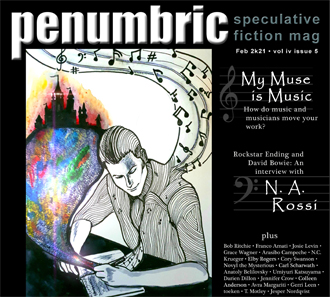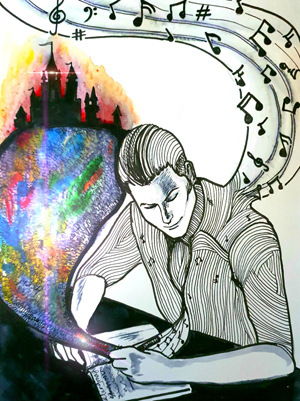
Inspiration Creation by Novyl the Mysterious
There he was again. Sometimes in a dress, often androgynous regardless, almost always with amazing make-up, exactly the kind of person most parents would have told their kids to stay away from, all sparkly and glam and flouting all the rules and traditions and mores of society. (Not that my parents ever said any of this, and my guess now is that it didn't really matter to them, but I suppose, as in every teenager's head, I imagined I was being quite the rebel.) His music itself, his lyrics, the stories he told ...
There he was again: David Bowie, influencing the way I dressed, the way I thought. Later, I would wander around science fiction conventions dressed as his Jareth from
Labyrinth, my blond hair spiked (as it usually was anyway), saying various lines from the film in what I imagined to be an accent approaching his--terribly creepy things like "Just let me rule you, and I will be your slave," which you could get away with at a convention but nowhere else, really. (A friend of mine at the con actually said, "That's frightening," and I in my dramatic haughtiness thought she was telling me my accent was spot-on. Sigh.)
He was there in all those moments, not even in an obsessive way, but in a respect way, an influential way. So how could Bowie not be an influence on my writing?
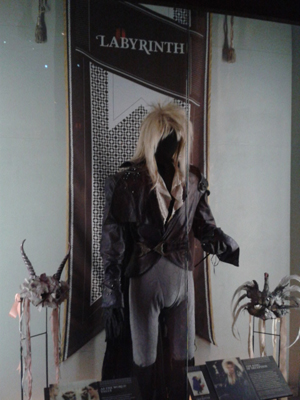
Bowie's Labyrinth costume, on display at Seattle's EMP museum, 2014. My own costume was nowhere near this elaborate, and the only pictures of that are lost in the pre-digital era.
We often discuss songwriters who've been inspired by written works. There are many songs by Led Zeppelin, for example, that are firmly lodged in Middle Earth; there are many songs by many bands that take Orwell to heart. But we don't often talk about the influence that music and musicians have the other way round: how do they influence our writing, our storytelling? I don't mean, of course, that we take literally the lyrics of a song and write out the story told therein in long form. But how do songs, either in the focused listening or as background, as feeling, enter into the tales we tell?
I can, of course, tell my own tale, which as you may imagine has a fair amount of Bowie in it and ultimately is just me prattling on again. But what of others? In addition to this issue's interview with N. A. Rossi, author of the Rockstar Ending series, I asked authors Lenore Sagaskie, Callum Pearce, and David Busboom what music did for them.
* * *
Just in general, I'd love to know what musicians/music influence your writing, and in what ways. Is there an artist who has a deep and underlying influence on a lot of your work? Or do you have specific songs that have sparked entire stories or characters? Or kinds of music/instrumentation?
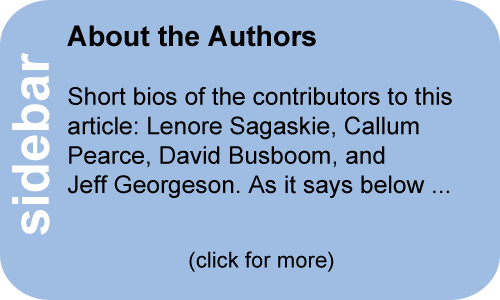
About the Authors
Lenore Sagaskie is a fantasy and horror writer from Canada living in self-imposed exile in Michigan. The first two books in her fantasy series: The Four Sworn: Spring Equinox and The Four Sworn: Summer Solstice, are currently available on Amazon. Her horror/comedy film, Out of the Grave, is in post-production indefinitely. Lenore is writing the third book in The Four Sworn series, and her next short film, Rage, is currently in pre-production. Her first feature length film, Be Wild, is in pre-production. You can find Lenore lurking on Twitter and Instagram as @lenorewrites, and on Facebook as herself.
More about Callum Pearce can be found at Callumpearcestoryteller.com
David Busboom is the author of more than a dozen short stories, most recently "Ahead of Dragons" in Planet Scumm #9. His debut novella, Nightbird, was published by Unnerving Books in 2018. His other fiction has appeared in such venues as Shock Totem, the Norwegian American, and the Saturday Evening Post. He currently edits a pair of scientific journals and lives in Central Illinois.
Jeff Georgeson is the managing editor of Penumbric. In the long-ago times, he may have written some short stories. He also works on some pretty science fictiony AI.
Sagaskie: I am one of those people who can't go one day without listening to music. It's a strong presence in my daily life and it serves many purposes: it calms me down when I'm anxious, it lifts me up when I'm down, it helps me relax, and it inspires my writing. Music is very much tied to memory, and in my case, tied to specific memories. I remember what was on the radio when I had my first kiss. I remember most of the songs I skated to as a teenager. I listened to a lot of Elton John when my first marriage ended. I don't know if it was something that I did intentionally, or if Elton John was more prominent on the radio at that time, but to this day there are certain Elton John songs that transport me back to that time when I was trying to get my life into a new normal routine. I listen to a lot of metal, and System of a Down and Gemini Syndrome are two of my favorite metal bands and are frequent additions to my playlists. System of a Down has a political focus and I find that listening to them helped me during the world-building process of my writing. Gemini Syndrome, and their
Memento Mori album, has philosophical perspectives that have been compelling when I've been wrestling with existential issues within my stories. I think it's safe to say that music has had, and still has, a significant influence on me.
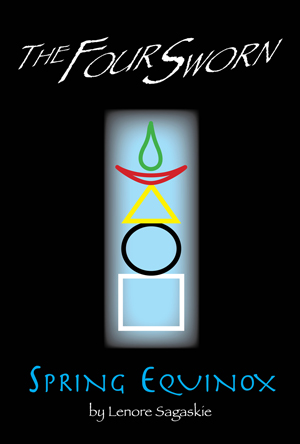
Cover of Lenore Sagaskie's The Four Sworn: Spring Equinox.
I can say with absolute certainty that specific genres of music have influenced my stories and characters. I've listened to a variety of music when writing the books in my series. When I'm developing my characters, I often find myself listening to music that I feel that the character would listen to, and I try to listen to that music when I'm writing scenes in which that the character is featured. Sara, The Air Vessel in
The Four Sworn: Spring Equinox, uses her abilities to conduct objects on the wind to the song "Shambala" by Three Dog Night. The genre of music was indicative of the type of music the character liked, and I felt the song was ethereal, which complemented the scene I created.
I believe that specific songs can grab your attention in many ways. I love Van Morrison, and his ability to add specific rhythm to a song and enhance it with vocalizations is superb. "Glad Tidings" is a favorite song of mine because it moves very fast, but he utilizes "la la la" refrains that keep the music moving at a happy, fast pace. If I am writing a story that moves at a fast pace, "Glad Tidings" will be at the top of my writing playlist.
Pearce: David Bowie is a big inspiration. On my life in general but also in some of the stories I tell. There is such a range of work, you can likely find music by David Bowie that sets the right mood for anything. When you are in the planning/first draft stages, it can be nice to have some background music.
I have written a story about a Ziggy Stardust type character before. I also have had one brewing for a while about his song "Valentines Day." It wouldn't be a retelling of the story he tells in the song. More inspired by the themes.
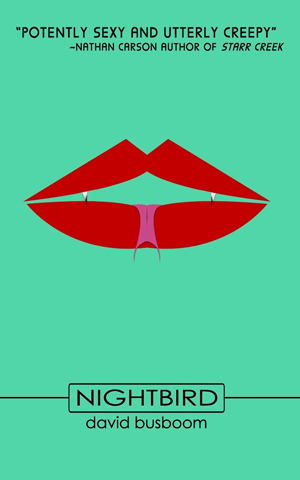
Cover of David Busboom's Nightbird.
Busboom: There's no one band or artist I can name that influences my writing more than any other, at least not so far, but 20th-century rock is where I draw most of my musical inspiration. As for specific songs, my story "From the Dusty Mesa" gets its title and some of its imagery from the Handsome Family song "Far from Any Road," which is probably best known as the theme song for Season 1 of HBO's
True Detective. That story was written in direct thematic tribute to the show, so it seemed appropriate at the time (I also just love that song). There's also a little Warren Zevon in that story, with a character named Carmelita who is loved by a junkie, etc. My story "She Said She Was a Magic Mama" is named after a line from the Frank Zappa song "Camarillo Brillo," but is otherwise unrelated. The most musically-influenced/inspired stories I've written so far are probably my Midnight Witch crime stories, all of which are set in the 1960s and '70s and feature a lot of rock from that era. Those are mostly very short and fairly violent, hopefully hitting like a good, quick hard-rock single, striking fast and wrapping up before you get bored.
Georgeson: Well, my general influences obviously include Bowie--not only getting in your head with ideas from the lyrics (whether explicit or just felt), but also as permission to reinvent oneself, or as moods. With Bowie, there's a vast arc of different sounds, different inventions going from the Ziggy times and songs like "Life on Mars" or "Ashes to Ashes," to the songs on
Heathen or
Earthling, to the Brian Eno-influenced
Outside, to
Blackstar.
However, even for me it isn't just one bit of music or musician--when I was a kid, I played The Strawbs "Deadly Nightshade" whenever I wanted to be in the mood to write some kind of dark fantasy, or The Alan Parsons Project had a lot of fantasy-feeling songs, or Earth, Wind & Fire; later, Sting, Berlin, Nine Inch Nails, Bauhaus, Skinny Puppy, Ministry, Garbage, In the Nursery, Mark Lanegan, and many, many more influenced or played background during my writing. Currently it's often music I don't even understand most of the lyrics of--like Band Maid. It's the feel of the music that leads me in these cases.
I do often come up with theme songs for characters, so that when I'm writing specifically about them/from their PoV/writing their dialogue I play that song, at least to start with. I'm rubbish with dialogue, so setting a mood really helps me get into character.
How do songs/musicians just sort of grab your attention? With vocals, instrumentation, etc?
Sagaskie: I find that when I'm listening to music my attention is first grabbed by the rhythm of the song, then the vocalization. I enjoy music that deviates from the norm or does something just a little bit different. One of my favorite songs by Enya is "Boadicea." The rhythm of the song is strong from the beginning, but the vocalization is just humming. Its simplicity with its combination of rhythm and vocalization makes it unique and it grabs your attention.
Pearce: Vocals usually but also the look. I've always been drawn to glam, but I also like some darker stuff. I think both come into my writing a little.
Busboom: Strong and/or interesting vocals grab me the quickest, I think. Anything from Rob Halford's exospheric screams to Leonard Cohen's subterranean latter-days growl, as long as it's unique enough to make me sit up and listen to the lyrics. That's not to diminish instrumentation at all (Halford still needs those unstoppable dueling guitars for it to be a Judas Priest song, after all), it's just that when I'm listening to music with vocals, it's the vocals I tend to latch onto most.
Georgeson: It can be the vocals (as with Bowie or Lanegan). However, often it's the feeling of the song as I get going, which often turns on the overall instrumentation--whether that be a more hauntingly symphonic sound as with In the Nursery, or the hard-driving guitars/drums/vocals of Band Maid.
Do you think a writer's own musical abilities (or lack thereof) influence whether or not music is a part of/an influence on their writing?
Sagaskie: I can't speak of other writers' experience, but I was raised with music. My father played several instruments when I was growing up, and we always listened to a variety of music genres. I don't play the violin with the proficiency of my father, but I played the French Horn (F) for 11 years. I also played Trumpet and Alto Horn. I have a genuine love of music and I believe that the writers I know that also have a genuine love of music mention music in their work and not only listen to music when they write, they also impart that feeling into their work.
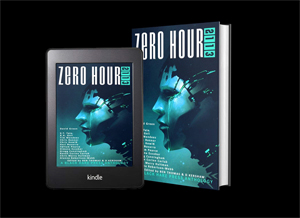
Cover of Zero Hour 2113, in which Callum Pearce's "Children of the Bionic God" appears.
Pearce: I'm not sure. I think writing has a beat to it, so you have to have some idea. I never really learnt any musical instruments aside from very basic stuff in school. I decided this year to start learning to play the violin. I don't think it's changed my writing, but I'm just getting started.
Busboom: I think if a writer is a musician, that will almost certainly find its way into their written work somehow, whether in the subject matter, the style, or something else. I'm not much of a musician myself, and maybe that's why music isn't a bigger direct influence on my writing, but it depends entirely on the individual.
Georgeson: I am so totally not a musician, so I can only speak from that PoV ... I suppose it influences the way I listen to the music. I'm not always able to pick out just what's being done with what instrument in what signature with which notes; I'm not generally able to separate the various instruments into tracks in my head, so it sometimes takes something very specific to get my head to listen to, say, the drums as a separate thing. I'm trying to train myself to do this a bit more, but that's not related necessarily to writing, just a sort of thing I'm interested in.
However, I do think music can be a huge influence whether or not one is a musician oneself. I'm my own proof of the "not" side of it, and my guess is an actual musician has that influence running through their lives like blood.
Do you think music has different kinds of influence in different cultures and eras (in terms of written works)? (For example, Sun Ra and Parliament-Funkadelic as part of Afrofuturism.)
Sagaskie: I do believe that music has different kinds of influence in different cultures and eras. I believe that Electronic Dubstep was very influential in the Steampunk genre, specifically Jim Butcher's Cinder Spires series. Horror author Stephen King always references music in his works and it's very indicative of the era the characters evolved in and a great way to reference their age and where they grew up, and even culture.
Pearce: Yes, I think it has to--sometimes, just because we see something related to those things so often in film and TV. If you hear a certain type of music you can imagine the type of film it would be associated with. For me, stories are little films in my head that I have to try and describe to people. So in some ways you imagine the background music you expect to hear for that genre or age. If you asked me to write a film set on the LGBTQ scene, for example, set in any period, I would have a list of go-to songs to set the mood for myself and probably mention in the story.
Busboom: Of course! Your example of Sun Ra and Afrofuturism is spot-on. Not sure I have another to add off-hand.
Georgeson: Definitely! I think there's an interconnection between the different creative arts, that you see influences twining between them throughout history. In the West, music, writing, and art all influenced one another in the Renaissance (albeit at different rates and at different times). I also think there's an integrated feel to these arts within and around other cultures. I think Afrofuturism is a good example (see our interview with Ytasha Womack in the August 2k20 issue); I think China, Japan, and India definitely display this as well.
Finally, music in games and films helps set up the whole "feeling" of scenes. Is there a way to do that in a written work? Can you get the reader to intuit your background music?
Sagaskie: I think there is a way to use music to convey the feeling of scenes in written work and it's something I like to do by referencing songs within the work or even subtle reference. In Stephen King's book
The Stand, he referenced a song, "Baby Can You Dig Your Man?" that hit the pop charts in his book. The song and reference to it helped to illustrate how music that was popular in the world before continued to live on despite the evolution of the song's creator or the change in society.
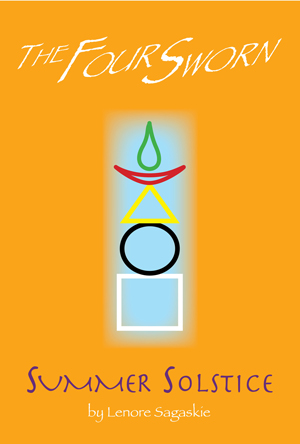
Cover of Lenore Sagaskie's The Four Sworn: Summer Solstice.
One of my favorite fantasy authors is Terry Prachett. In his book
Soul Music, I think he does an amazing job getting the reader to intuit the music as rock, mostly because the name of the band in the book is "The Band That Has Rocks In." The fact that the music has actual rocks used as instruments stirs the imagination. In book two of my series,
The Four Sworn: Summer Solstice, one of my characters learns to use a cell phone and program songs as ring tones. One song causes the character to panic when they hear it because they are avoiding the character that was calling. I believe the reader clearly understood the emotion that song evoked. I'm currently working on the third book in my series,
The Four Sworn: Autumn Equinox, and music is an integral part of the story. The story begins 200 years in the past when singers selected from around the world to sing a song of peace are mysteriously turned to stone. It is my hope that readers will not only intuit the background music but also the intent of the music and the importance behind performing the song and its significance.
I think that writers understand words have power. Music has the power to evoke memory, heighten our senses, and convey emotion. I think it's a challenge for writers to emulate its ability to conjure that feeling through writing. Sometimes we fail, but when we succeed, music brings another layer to the story by subtly stirring other senses. In doing so, we create a strong tie to memory. The reality is that's what all of us ultimately want as writers--readers to remember our stories.
Pearce: Yes, sometimes just blatantly putting the title and throwing some odd lyrics in works. It can break up a scene and set the mood at the same time. It can be done more subtly where you pick out what stands out to you about that song and work that in. Or sometimes the video that went with it. Take images from that, and people who know it will make the connections.
Busboom: I think there is a way to do it, other than direct reference, but I couldn't say with any sense of authority how best to go about it. The idea of structuring a scene on a paragraph and/or sentence level to match a particular piece of "soundtrack" music sounds kind of appealing to me, but I've never consciously tried it.
Georgeson: God, that would be so cool, wouldn't it? I think at its best writing kind of does that, although the more song-like it is the more easily it does so, so poetry is probably closer to that than stories. I think that through the cadence of sentences, word choice, and so forth one can get a feeling going. In this issue I totally get that with "A Visit from the Beatles," for example. One can make a sort of musical painting. And I think that possibly if one is listening to music whilst reading, one can sometimes get a sort of cognitive dissonance going on if the music and the story just don't grock.
* * *
Final thoughts
I began this article thinking primarily about writing and music, but ultimately, I think just applying the idea of a two-way street between them is quite limited. It's really a sort of multiverse of streets going all directions. All creators--whether visual artists, lyrical artists, word artists, whatever--are influenced by others just by virtue of living in the world and being aware of it. However, it's still really interesting to see what one group of creators says about the influences of others. As Neil Gaiman has said, "I think it's really important for a writer to have a compost heap. Everything you read, things that you write, things that you listen to, people you encounter -- they can all go on the compost heap, and they will rot down, and out of them grow beautiful stories." I'd broaden that from just writers to everyone who creates, and not just your experiences in the present, but with the past.
Also, I think what Lenore Sagaskie said at the end of that final question bears repeating: that words and music both have power, and that when we are successful, the intertwining of music and writing creates a strong memory of our work in readers' minds. And, as she says, "the reality is that's what all of us ultimately want as writers--readers to remember our stories."







